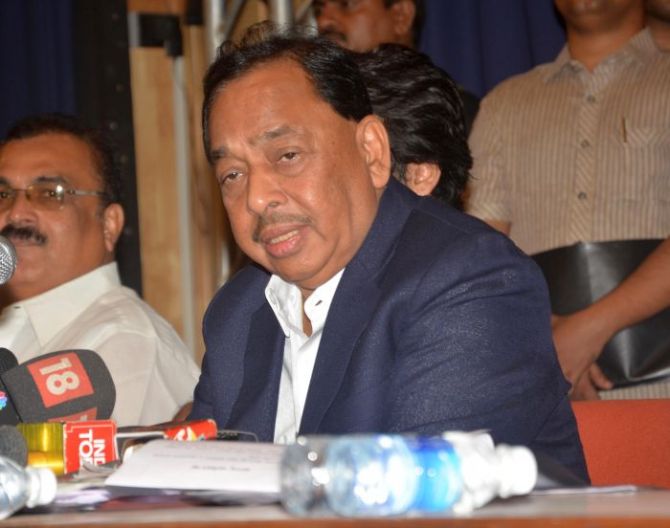The street-fighter attitude is what keeps Rane going even at 69.
The expectation is -- at least in the BJP camp -- that he will be itching for a battle royale with the Shiv Sena in its bastions.

Beginning life as a clerk to becoming a Shiv Sena shakha pramukh to becoming Maharashtra's chief minister to becoming the leader of the Opposition in the state assembly, then quitting the Sena to join the Congress in 2005 and becoming the state's industries and revenue minister to forming a new political outfit in 2017 to joining the Bharatiya Janata Party in 2018, Narayan Tatu Rane's political career had seen umpteen ups and downs.
With his elevation as the Union Cabinet minister for micro, small and medium enterprises, the 69-year-old first-time Rajya Sabha MP from Maharashtra's Sindhudurg will begin a new innings.
Given his pugnacious itch to take on his former political parties in Maharashtra this latest addition into the Narendra Damodardas Modi ministry will come in handy to help the Maharashtra BJP take on the Maha Vikas Aghadi -- specifically the Shiv Sena with whom Rane had had many a colourful fights -- and fill in the void of a strong Maratha leader, albeit from Konkan, where the community is not too strong as a political bloc, feels political analyst and Maharashtra observer Vivek Bhavsar.
Bhavsar discusses with Prasanna D Zore/Rediff.com Rane's relevance in Maharashtra politics, how the Congress used him to weaken the Sena in the state when he joined the party in 2005 and how the BJP will utilise his services to try and weaken the Shiv Sena.
Rane's party-hopping adventures
Narayan Rane quit the Shiv Sena in 2005 to join the Congress. Given his acrimonious exit from the Sena he ensured his exit would bring trouble for the party that made him chief minister. He entered the Congress along with 12 of his loyalist MLAs from the Sena.
Today, except for Vijay Wadettiwar, who happened to be Rane's favourite then, no other MLA who had entered the Congress with him is with the party today; Wadettiwar is a minister in the Maha Vikas Aghadi government.
Rane has an image of being aggressive and an always-ready-for-a-fight leader with whoever his political opponents are. Both the Congress and the BJP have used Rane's aggression to take on the party (Shiv Sena) that mentored him.
Interestingly, Rane, who thought his powers and responsibilities would increase by jumping parties, couldn't expand his power beyond his hometown of Sindhudurg (also a district) as the Congress and BJP used him to try and finish the Shiv Sena in the Konkan region.
He wanted to become the leader of the Opposition in the Maharashtra legislative council, but the Congress did not play ball. In desperation, Rane formed his own party -- the Maharashtra Swabhiman Paksh. Rane was miffed with the Congress for not fulfilling what it had promised him then. He was left with no choice but to join the BJP.
His entry into the BJP was not too smooth either. His secret meetings with Amit Shah (then the BJP president) would be leaked to the media (by BJP insiders) to dent his image as a self-respecting strongman and leave him with no choice but to join the BJP without any conditions attached. He was made to merge his party into the BJP and join the party.
Since 2019, Maharashtra politics has gone through upheaval (the split in the alliance of the Shiv Sena and BJP with the former joining hands with the Congress and Nationalist Congress Party).
Rane's tryst with Maratha reservation politics
Against this backdrop, the issue of reservations for Marathas and OBCs had become unpalatable for most parties to handle in Maharashtra.
When Prithviraj Chavan was the chief minister between 2010 and 2014, Narayan Rane was the industries minister in the Congress-NCP government. He was also made chairman of the committee that was appointed to decide on reservations for the Maratha community under the OBC umbrella.
Rane was quick to tour the state then to increase his sphere of influence among the Maratha community as well as the OBCs. He met many top leaders who were demanding reservations for the Marathas and also those who were opposed to bring the Marathas under the OBC umbrella.
This committee after holding consultations with all the stakeholders recommended 16 per cent reservations for the Marathas without infringing upon the reservations of other OBC groups in the state.
The Congress-NCP government accepted the Rane Committee's recommendations but it did not 't hold water in the courts.
When the ball was lobbed into the BJP's court when it came to power in 2014 led by then chief minister Devendra Fadnavis, the party reduced the Maratha quota from 16 per cent to 12 per cent quota in educational institutions and government jobs. The Maratha community is still angry at this breach of faith by the Fadnavis government.
In recent times, Sambhaji Raje (the BJP MP from Kolhapur and a descendant of Chhatrapati Shivaji Maharaj) has been in the forefront of this battle for Maratha reservations. He e has been making efforts to bring the community on one platform, but the possibility of Sambhaji Raje continuing in the BJP remains dim.
Enter Narayan Rane
Narayan Rane's elevation into the Union Cabinet looks like a bid to neutralise Sambhaji Raje's influence among the Marathas.
He will also be assigned the responsibility of placating the angry Maratha community that hugely decides the outcome of electoral politics in Maharashtra.
There is hardly any Maratha leader of substance and stature in the state BJP right now. Elevating Rane to the Union Cabinet may not only help Modi earn some brownie points with the Maratha community, but also help the BJP add to its aggression against the Shiv Sena.
With Rane's elevation it is evident that the BJP is no longer interested in having any truck with the Shiv Sena and would like to grab the Sena's Hindutva constituency.
The BJP has been defiant about finishing off the Shiv Sena's bastions in Konkan, Thane and Mumbai. Rane and his supporters, despite his waning influence, still hold strong forts in these regions. Rane's importance to the BJP is linked to this single-point agenda.
Seeking revenge?
Rane was defeated by the Shiv Sena's Vaibhav Naik (in Kudal from where he had won six terms as MLA) and he has been nursing a strong grudge not only against his mother-party (the Shiv Sena) but also against local strongmen in Sindhudurg and Ratnagiri.
Then there is also the Shiv Sena's Ratnagiri-Sindhudurg MP Vinayak Raut whose influence Rane would want to finish off.
The BJP is also nursing a grude against Shiv Sena MLA Bhaskar Jadhav from Konkan's Guhagar constituency, who, as the presiding officer in the Maharashtra assembly was instrumental in suspension of 12 BJP MLAs.
The BJP knows that only Rane, despite his age, has the guts to take on these Sena strongmen on their home turf. Now, with the heft of being a Union Cabinet minister and additional resources that he might get, Rane will only spell more trouble for Sena in coming days.
Still a Sainik
He might have joined the Congress first and then the BJP, but it is his Shiv Sena style fighting spirit that runs in his blood even now. He has always been a fighter who never gets bogged down by defeat.
The street-fighter attitude is what keeps Rane going even at 69. The expectation is -- at least in the BJP camp -- that he will be itching for a battle royale with the Shiv Sena in its bastions.
Despite his age he doesn't have any major medical conditions, leave aside diabetes.
Filling BJP's Maratha leader void
In the absence of any dominant Maratha leader in the BJP, the ground is fertile for Rane to fill the void in the state. In fact, that seems the sole purpose why Modi brought Rane in the Union Cabinet.
There is a strong sentiment among a dominant section of Marathas that the Fadnavis government took them for a ride in the way it handled the issue of reservations in the courts. Now, with the MVA in the saddle, and Ashok Chavan too being indecisive to find out a solution to the vexed problem of Maratha reservations, Rane can emerge as a Maratha strongman if he plays his cards well.
With Sambhajiraje knowing fully well that the reservation issue could be solved only by way of a review petition in the Supreme Court and not by the Union government, he is on his way out of the BJP.
Modi on several occasions refused to meet Sambhajiraje to discuss the issue, and he has come to the realisation that the BJP and its ideological parent (the Rashtriya Swayamsevak Sangh) may not be too inclined towards granting reservations to the Marathas. That explains his recent overtures to the Congress, the NCP and Shiv Sena, with whose chief minister, Uddhav Thackeray, he has built a good rapport. There is a strong buzz that he is planning to join the Congress at an appropriate time.
Trouble ahead for Shiv Sena
When one absorbs how since the last six months the Modi government has singularly targeted NCP leaders, (former state home minister) Anil Deshmukh for instance, with the help of the ED and CBI, it is quite evident that the BJP doesn't want to join hands with the NCP.
Soon after Uddhav Thackeray's meeting with Modi a month ago, speculation was rife that the former allies could get back together. Even though Anil Parab's (Shiv Sena leader and state transport minister) name cropped up in ED investigations, he was not summoned by the investigating agency, unlike the ED shooting summons to Deshmukh with glaring regularity and the CBI investigating alleged charges of corruption levelled against him by former Mumbai police commissioner Param Bir Singh.
Miffed by the Sena's role in getting 12 BJP MLAs suspended, the BJP made sure to rile the Sena with Rane's elevation to the Union Cabinet. The fact that he was the first in the list of 43 ministers to be called for the swearing-in by President Ram Nath Kovind also underlines the rivalry between the two former alliance partners.
The Shiv Sena, which had ministers in the Union Cabinet during then prime minister Atal Bihari Vajpayee's tenure, never got this honour.
All these happenstances combined together make it evident that the BJP has decided to put a lid on it forming a government in Maharashtra either with the Shiv Sena or NCP. The BJP would rather shore up its defences for the rest of the MVA government's tenure and what better pawn could it use in this battle than Narayan Rane?
One Cabinet rank and three MoS
OBCs vs Marathas: Striking a balance
Dr Bhagvat Krishnarao Karad, who is now the minister of state for finance, is a Vanjari by caste, and was a confidante of the late BJP strongman Gopinath Munde from the same community.
Dr Karad, though always loyal to the BJP, got lucky because it was necessary to give representation to the Vanjari community and strike a balance between the Maratha and OBC groups in Maharashtra.
He found a place in the Union ministry to neutralise the efforts of Pankaja Munde (Gopinath Munde's younger daughter who lost the 2019 assembly from her home borough of Beed) who was experimenting with cobbling together a coalition of Mali-Dhangar-Vanjari (all OBCs) communities.
The other OBC minister from Maharashtra, Kapil Moreshwar Patil (minister of state for Panchayati Raj) belongs to the Agri community known for their aggressive politics. The fact that he was the only BJP Lok Sabha candidate who won from Thane's Bhiwandi constituency, a Shiv Sena stronghold overseen by the Sena's Eknath Shinde, also worked in his favour.
A Union ministry will help improve Patil's stature not only among the Agris, but also help him take on Shinde whose political influence in Thane is unparalleled.
In fact, even when the Shiv Sena and BJP were in alliance between 2014 and 2019, Patil worked openly against the Sena's interests in Thane district with the aim of weakening its political strength.
Dr Bharati Pravin Pawar, the BJP's Lok Sabha MP from Nashik's Dindori, a reserved scheduled tribe seat, who was appointed minister of state for health and family welfare, is a trained medical practitioner and represents the scheduled tribes in Maharashtra.
These four ministerial berths from Maharashtra adequately take care of the representation of various castes and communities in the state.
Washing clean Rane's ED case?
Rane has always been an aggressive leader who has often not backed off from criticising his party bosses. When in the Shiv Sena he took on Balasaheb Thackeray and Uddhav Thackeray. While in the Congress, he minced no words while taking on the party leadership at the state and national level. That's the reason why he did not stay put in any one party for too long and formed the Maharashtra Swabhiman Paksh.
The charges of corruption or money laundering did not go too far and the charges of corruption did not stick against him. The documents were handed over to the ED but there was no further investigation by the ED.
(In 2017, then BJP MP from Mumbai North East Kirit Somaiya had alleged that Rane and his sons had diverted wealth from tax havens to Avighna One, a luxury residential tower being constructed in Lower Parel, sourth central Mumbai. The Rane family was also being investigated for violation of floor space index and Somaiya had written to then joint director, Enforcement Directorate, Satyabrata Kumar, seeking an investigation into alleged wrongdoings by companies owned by Rane and his sons Nilesh and Nitesh).











 © 2025
© 2025